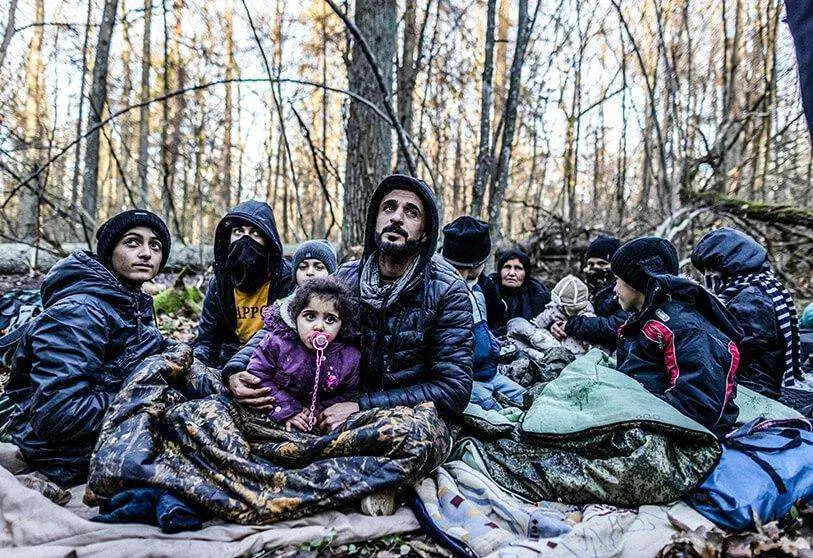Harsh living conditions in Iraqi Kurdistan force thousands of Kurds to migrate to Europe

The recent migration crisis on the Polish-Belarusian border has once again shown the plight of refugees from the Middle East and their desperation to leave their countries in search of a better life. Instability, corruption and violence in many parts of the region have driven thousands of people to try to reach Europe. Iraqi Kurdistan is one such area that has suffered an exodus due to the living conditions of its citizens. Iraqi Kurds who have reached Europe's doorstep complain of low wages, unemployment, lack of public services and repression, among many others.
This repression has been witnessed by hundreds of students who have been demonstrating since last year in Iraqi Kurdistan, especially in the city of Sulaymaniyah. The authorities suppress these protests violently, using tear gas and firing live ammunition into the air. Students are denouncing cuts in the education sector, and teachers and other civil servants are also demonstrating to demand full payment of their salaries. "Some students can't afford to travel back to the provinces and others don't have enough for three meals a day," one student told AFP news agency. The UN has echoed the situation, denouncing "arbitrary arrests, unfair trials and intimidation of journalists, activists and protesters".

Another issue driving Iraqi Kurds to leave their home is political corruption. Migrants point in particular to the Barzani and Talabani families, two clans that have controlled Kurdish areas in Iraq since 1991. "In Kurdistan, for 30 years, two mafia-like, thieving and immoral families have ruled the country," Kurdish poet and activist Umed Ahmed laments to the Middle East Eye. "It is impossible to find a job unless you have connections with the ruling elite," Asos Hassan told Al Jazeera. Hassan managed to reach the European border, but unlike Ahmed, he was deported by the authorities and sent back to Kurdistan. It was not the first time he had tried to reach Europe. He tried twice to cross the Aegean Sea to Greece but was deported by the Turkish authorities. "I will continue like this even if I am deported dozens of times. I would rather die than continue to live this miserable life," the young Kurd told the Qatari media.
In this regard, it is worth noting the oppression of Kurdish citizens in the north by Turkish troops since Ankara began an offensive against Kurdish forces in the area a few years ago.

During the first ten months of 2021, nearly 37,000 people from Iraqi Kurdistan have left the region, according to figures from the Lutka Foundation for Refugee and Displaced Affairs, an Iraqi NGO in the area. Of these citizens, 10 have died en route to Europe and 12 are missing. The NGO also claims that since 2015, almost 635,000 Kurdish people have migrated to Europe.
At least 11 migrants have died during the migration crisis between the European Union and Belarus, including some of Kurdish origin such as Gaylan Delir Ismael or Bakhtiyar Mousazadeh, two 25-year-olds; or Kurd Khalid, 34. Gaylan Delir was diabetic and "emigrated to receive medical treatment", as his mother reported to the Kurdish comment media Rudaw. Khalid travelled to accompany his younger brother, who wanted to emigrate.

However, Kurds have also been the main victims in the recent tragedy in the Canal de la Mancha. At the end of November, 27 men, women and children died while trying to cross from France to the UK. Among the dead was a 24-year-old Kurdish woman who was planning to meet her fiancé in England. "The whole world talks about Europe as a calm place, which is nice, is that what calm means? 30 people dying in the middle of the sea? It's a sin to put people through this," the young woman's father told the BBC.
The history of the Yazidis is one of persecution, violence and pain. After the genocide suffered at the hands of Daesh since 2014, many of the survivors managed to emigrate to countries in Europe, the United States or Canada. However, those who could not leave Iraq are still in a vulnerable situation. They complain that they do not receive sufficient support from the authorities, and they still face rejection by part of society. For these reasons, many Yazidi citizens have tried to leave Iraq in search of a better life, as have the Kurds.

Among the migrants stranded at the Polish-Belarusian border are a large number of Yazidis, although some have already been moved back to Iraq. In mid-November, more than 400 Yazidis landed in Erbil and Baghdad. Many of them, before travelling to Europe, had been living in refugee camps in Iraqi Kurdistan in the aftermath of the genocide. "Our situation was terrible, Daesh destroyed our houses. Our tents were also burnt in the refugee camps. We had nothing left, that's why we left," a woman at Erbil airport explained to Middle East Eye journalist Wladimir van Wilgenburg.

Murad Ismael, co-founder of Yazda, an NGO dedicated to the Yazidis, has called on Europe to "play a more active role in addressing the economic and humanitarian problems of Iraq as a whole and especially for the war-torn areas". Pari Ibrahim, founder and executive director of the Free Yazidi Foundation (FYF), called for migrants at the border to be given the basics, such as shelter, food, water and heating. "These are survivors of genocide and they are desperate, traumatised and suffering. If you look at the services offered to Yazidis in Iraq, you can understand why they leave," she added.








